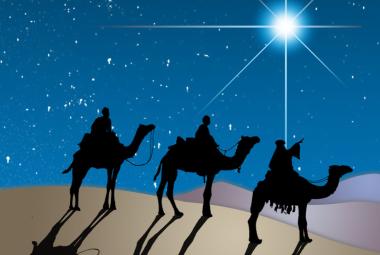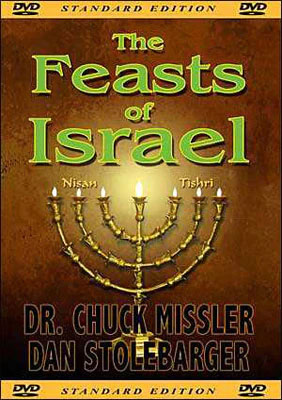The anti-Semitism of the early Church is one of the great tragedies of history. While the teachings of Jesus came straight from the Hebrew Scriptures, a backlash against ritualistic devotion to the Law developed into a deliberate attempt to steer away from the Old Testament. Tensions with the Jews led to severe persecution as the Church became a dominant political institution during subsequent centuries. A wedge was driven between Jews and Christians, although both worshipped the God of Abraham, Isaac, and Jacob. Jewish communities developed a staunch resistance to Jesus as the Messiah, and Christians lost the richness of Jewish history and prophecy, the very foundations of faith in Jesus Christ.
As Christians, we need to understand our Jewish roots. Many of the teachings of Christianity take on deeper insight and meaning when we understand them in a Jewish context, and few places is this more clear than in a study of the feasts of Israel. The seven Feasts of Moses are not only commemorative historically as they are observed in Judaism, but every detail of these seven feasts are anticipatory of the person and mission and achievement of the Messiah.
The first three Feasts of Moses take place in the spring; the Passover Feast, the Feast of Unleavened Bread, and the Feast of First Fruits. They all occur in the first month of the religious year, Nisan. In this article, we will take a look at the third of the three feasts.
The Feast of First Fruits
In Leviticus 23:4-5, God sets the date for Passover. God sets the date for the Feast of Unleavened Bread in Leviticus 23:6-8, and in Leviticus 23:9, He describes the Feast of First Fruits, “And the Lord spoke unto Moses saying, ‘Speak unto the children of Israel and say unto them: When ye are come into the land which I give unto you ...” (notice they start observing this in the days of Joshua, that is, after the coming into the land) “...and ye shall reap the harvest thereof, then ye shall bring a sheaf of the first fruits of your harvest unto the priest.”
In other words, this sheaf was representative of the entire harvest. They’re to offer that one sheaf as a token of the whole harvest. Leviticus 23:11 says, “and he (the priest) shall wave the sheaf before the Lord and be accepted (by God) on the next day after the Sabbath, the priest shall wave it.”
Christ Our First Fruits
We know from Matthew 28:1 that after the end of the Sabbaths (plural) the women came to the tomb where Jesus had been buried. Passover could fall on any day of the week depending on the year. Regardless of what day it was, the Feast of First Fruits always fell on the first day after the Sabbath after Passover (Leviticus 23:10-11). The Feast of First Fruits, the first of the harvest celebrations, therefore always took place on a Sunday.
Now upon the first day of the week, very early in the morning, they came unto the sepulchre, bringing the spices which they had prepared, and certain others with them. And they found the stone rolled away from the sepulchre. And they entered in, and found not the body of the Lord Jesus. And it came to pass, as they were much perplexed thereabout, behold, two men stood by them in shining garments: And as they were afraid, and bowed down their faces to the earth, they said unto them, Why seek ye the living among the dead? He is not here, but is risen: remember how he spake unto you when he was yet in Galilee, Saying, The Son of man must be delivered into the hands of sinful men, and be crucified, and the third day rise again.
Luke 24:1-7
This is powerful testimony. That Sunday morning, when the smoke at the Temple was going up from the sacrifice of First Fruits, a group of women returned to dress the body of Jesus with spices and fragrant oils, but they found they were too late. The morning of the Feast of First Fruits, Jesus Christ Himself became the first to rise again from the dead. It’s interesting that the “first fruits” represented the entire harvest. Think about that. Jesus Christ is the First Fruits of those who slept.
Paul the scholar understood these things, filled with the understanding given him by the Holy Spirit. He told the Corinthians:
But now is Christ risen from the dead, and become the firstfruits of them that slept. For since by man came death, by man came also the resurrection of the dead. For as in Adam all die, even so in Christ shall all be made alive. But every man in his own order: Christ the firstfruits; afterward they that are Christ’s at his coming.
1 Corinthians 15:20-23
Jesus fulfilled these feasts to the letter. He was our Passover, marking us with His blood so that the wrath of God would pass over us. He was crucified on the very day the traditional lamb was slain, on the 14th of Nisan. He was then resurrected on the day the Feast of First Fruits was celebrated. Right on time!
What are the applications of the Feast of First Fruits for us?
I am crucified with Christ: nevertheless I live; yet not I, but Christ liveth in me: and the life which I now live in the flesh I live by the faith of the Son of God, who loved me, and gave himself for me.
Galatians 2:20
Of his own will begat he us with the word of truth, that we should be a kind of firstfruits of his creatures.
James 1:18
James is the Lord’s half-brother, who didn’t believe in Jesus while He was on the earth, but after His resurrection not only did James become a convert to Jesus but he became the leader of the Council in Jerusalem and wrote the epistle that bears his name.
There’s something that is often missed by many Bible students. The Feasts of First Fruits is the Jewish term for what you and I call Easter, or Resurrection Sunday. We can enjoy a new beginning in Christ because of the Resurrection and there’s an Old Testament parallel to this in Genesis 8.
In Genesis 6, God decides to wipe out the entire population of Earth with a Flood. He had His reasons, but the point is He decides to wipe out what some people calculate to be over a billion people, but saves eight—Noah, his wife, his three sons and their wives. Eight—that’s an interesting number. In the Hebrew language, numbers have meaning. Seven is the number of completion. Eight is the number of a new beginning. What a “coincidence.” God makes an entirely new beginning on the earth with eight people.
When does this new beginning by God through Noah begin? The Flood of Noah begins in chapter 7 of Genesis and ends in chapter 8 verse 4, when the Ark rested on the 17th day of the 7th month on the mountains of Ararat.
If you are a normal, well-adjusted Bible student and you come across a verse like, “the Ark rested in the 7th month, on the 17th day of the month, upon the mountains of Ararat,” you continue on reading. But if you’ve been to a Chuck Missler Bible study, you are no longer a normal, well-adjusted Bible student. I am convinced there are no irrelevant details in Scripture, and that every detail in the Word of God is there by deliberate design.
A rabbi will tell you, whenever you find a story that seems to have some unnecessary detail, it is a remez—a sign that says “dig here, dig deeper.” Genesis 8:4 is worthy of the question, “Why does the Holy Spirit want us to be aware that the Ark came to rest on the 17th day of the 7th month?”
Two Calendars
It is important to remember that the Jews have two calendars, not just one. The calendar in Genesis is the original calendar, the one that starts the Jewish New Year in the fall. The original names of most of the months have been lost, but the first month in the Hebrew civil calendar is now called Tishri, and it is on the first day of that first month of the civil calendar that the Jews celebrate Rosh Hashanah.
It isn’t until the book of Exodus that God tells Moses to change the calendar so that the seventh month becomes the first month instead.
And the Lord spake unto Moses and Aaron in the land of Egypt, saying, This month shall be unto you the beginning of months: it shall be the first month of the year to you.
Exodus 12:1-2
Because of Exodus 12:2, Nisan is the first month of the religious calendar, the month of the Passover. During the time of Genesis, however, Nisan would have still been considered the seventh month, and therefore, the Ark came to rest on the mountains of Ararat on the 1th of the month we now call Nisan.
Months | Old | New |
|---|---|---|
Tishri, (Ethanim) | 1 | 7 |
Cheshvan, (Bul) | 2 | 8 |
Chisleu | 3 | 9 |
Tevet | 4 | 10 |
Sh’vat | 5 | 11 |
Adar | 6 | 12 |
Nisan, (Aviv) | 7 | 1 |
Ilyar (Zif) | 8 | 2 |
Sivan | 9 | 3 |
Tammuz | 10 | 4 |
Av | 11 | 5 |
Elul | 12 | 6 |
The crucifixion of Christ took place on the 14th of Nisan. He was in the tomb, lying dead, for three days. That means He remained resting in the grave until the end of 17th day of Nisan. The new beginning for the Planet Earth according to the account in Genesis 8:4 was the 17th day of Nisan, when the Ark finally came to rest in the mountains of Ararat. Thus, God arranged for His “new beginning” of Planet Earth in the days of Noah to occur on the “anniversary”—in advance—of our “new beginning” in Christ. As the rabbis are fond of pointing out, “coincidence is not a kosher word.” There are no accidents or coincidences in God’s kingdom.
An Apocryphal Post Script
I can’t resist sharing with you a story Chuck Smith told me some time ago. It seems there is a missing conversation that’s recorded outside the Scripture between Joseph of Arimathea and Pontius Pilate. You know that Joseph of Arimathea was probably the richest man in the area and he was also a kinsman of Christ. A dead body could only be released to a kinsman for burial. Also, Joseph of Arimathea had to be a powerful person to have direct access to Pilate in the first place. So he goes to Pilate to plead for the body. Of course, he and Nicodemus were going to take care of the burial ritual and cost. He approaches Pilate, which is impressive because you don’t just walk up to the Roman Procurator. You have to have clout. Pilate is flabbergasted with the request. He says “Joseph, I don’t understand you. You’re the richest man in the area. You’ve got this brand new tomb for your family and you’re going to give it to this criminal?” And Joseph says, “Why not? It’s just for the weekend!”
Summary of the Spring Feasts
Our intention in superficially summarizing the Feasts of Moses has been to stimulate your awareness of the feasts. We’ve explored the first three feasts in the month of Nisan, sometimes called the spring feasts in Israel and they are, of course, rich in content and exciting to study. The more you study these feasts, not only in the Scripture but also how they are observed, you will constantly encounter new insights that are fascinating if you look at them through the lens of the New Testament.
These first three feasts have already been fulfilled by Jesus. The New Testament tells us that Jesus is our Passover Lamb.1 He was made sin for us.2 He became sin for us so that we can become righteous (unleavened bread—without leaven) when united in Him. And He is our First Fruits.3
This article is an adapted excerpt from Dr. Chuck Missler’s book The Feasts of Israel, available from our online store https://store.khouse.org. Also available as a 2 hour audio/video presentation.




